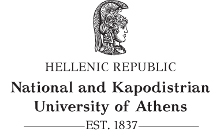School of Economics and Political Sciences
Department of Political Science and Public Administration
ELECTORAL SOCIOLOGY
The course presents the major milestones that have shaped the themes and methodology of electoral sociology. It explores the main theoretical models used to analyze and interpret electoral data. Additionally, the fundamental principles of electoral systems are discussed. Following this thematic and methodological framework, the course reviews significant milestones in the Greek electoral landscape from 1864 to the 21st century.
Course Objectives:
- Provide an understanding of the basic parameters and various aspects of the electoral process.
- Synthesize the different approaches to electoral behavior.
- Develop an understanding of electoral systems as mechanisms for converting votes into representation.
- Highlight the most significant developments and key "moments" in Greek electoral history.
Course Content:
- Elections: Basic Concepts
- Electoral Geography and Political Ecology
- The Micro-Sociological Model
- Party Identification and the Psychosocial Model
- Campaigns, Polls, Issues, and Personalities
- Cleavage Structures: The Macro-Sociological Model of Lipset & Rokkan
- Rational Choice Theory and Electoral Behavior
- Majoritarian Electoral Systems
- Proportional Electoral Systems
- Key Concepts and Tools for Electoral Analysis: second-order elections, indicators of electoral volatility, and nationalization of the vote.
- Greek Electoral History: 1864-1936
- Greek Electoral History: 1946-1967
- Greek Electoral History: 1974-21st Century
Learning outcomes
Upon successful completion of the course, students will have gained a comprehensive understanding of the evolution of electoral behavior analysis at an international level. They will be able to understand the fundamental mechanisms of electoral systems, identify analogies, continuities, and breaks in Greek electoral history, and will be equipped to interpret and analyze electoral results.
Course texts
- Aranitou, V., Georgiadou, V., and Tsatsanis, M. (eds.) The Electoral Behavior of Greeks. Athens, Gutenberg.
- Mayer, N., (2005) Electoral behavior, Athens, Savvalas publications.
- Nikolakopoulos, E., (2012) Electoral Passions, Athens, Alter Ego Publications.
- Voulgaris, Y. and Nikolakopoulos, E. (2014). Introduction: The Electoral Earthquake of 2012. In Voulgaris, Y and Nikolakopoulos, E. (eds.) 2012: The Twin Earthquake Election. Athens: Themelio, pp. 9-31.
